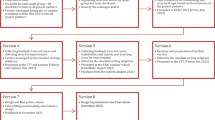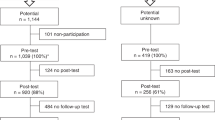Abstract
There is a limited understanding of the student perspective of integrity in postgraduate research. This is of concern given that ‘research trainees’ may have a vulnerable position in formal investigations of research misconduct. This paper analyses qualitative data drawn from an Australian online academic integrity survey in a mixed methods research study. This analysis complements the quantitative survey data analysed earlier and sought to explore factors contributing to postgraduate research students’ satisfaction with policy and process, the ways institutions can support students’ understandings and practice, suggestions for improving breach processes, and students’ concerns. We found that integrity training and modelling of ethical behaviour by staff were key factors contributing to students’ satisfaction. Students would have liked more ‘hands-on’ integrity training, accompanied by consistent and transparent enforcement of policy. Respondents expressed concern about the credibility of research output and educational standards. We call for recommendations from the extensive literature on academic integrity policy and practice to be extended to the postgraduate research sphere.

Similar content being viewed by others
Notes
In Australia, students undertaking research as part of a graduate degree program (such as Masters by Research, Doctor of Philosophy) are referred to variously as Higher Degree by Research (HDR) students, or postgraduate research students. We have chosen to use the latter term as this most clearly describes this cohort for an international audience.
Some may argue that postgraduate research students may not have equated the term ‘academic integrity’ with ‘research integrity’. However, the qualitative data provided by this group of students clearly suggests that the definition of academic integrity provided in the original survey—“Academic integrity is about mastering the art of scholarship. Scholarship involves researching, understanding and building upon the work of others and requires that you give credit where it is due and acknowledge the contributions of others to your own intellectual efforts” (University of Tasmania 2010)— encompasses research integrity. This is a view that the authors share.
References
ABC News. (2011). German minister quits amid plagiarism scandal. March 2. http://www.abc.net.au/news/2011-03-01/german-minister-quits-amid-plagiarism-scandal/1962908. Accessed 26 July 2014.
Anderson, M. S. (2007). Collective openness and other recommendations for the promotion of research integrity. Science and Engineering Ethics, 13, 387–394.
Antle, B., & Collins, W. (2009). The impact of a spirituality-based support group on self-efficacy and well-being of African American breast cancer survivors: A mixed methods design. Social Work and Christianity, 36(3), 286–300.
Birrell, B. (2006). Implications of low English standards among overseas students at Australian universities. People and Place, 14(4), 53–64.
Bretag, T. (2007). The emperor's new clothes: Yes, there is a link between English language competence and academic standards. People and Place, 15(1), 13–21.
Bretag, T., Mahmud, S., Wallace, M., Walker, R., Green, M., East, J., James, C., McGowan, U., & Partridge, L. (2011). Core elements of exemplary academic integrity policy in Australian higher education. International Journal for Educational Integrity, 7(2), 3–12.
Bretag, T., Mahmud, S., Wallace, M., Walker, R., McGowan, U., East, J., Green, M., Partridge, L., & James, C. (2013). ‘Teach us how to do it properly!’ An Australian academic integrity student survey. Studies in Higher Education. doi:10.1080/03075079.2013.777406.
Bryman, A. (2006). Integrating quantitative and qualitative research: How is it done? Qualitative Research, 6(1), 97–113.
Butler, S. S. (2006). Evaluating the senior companion program: A mixed-method approach. Journal of Gerontological Social Work, 47(1/2), 45–70.
Carroll, J. (2002). A handbook for deterring plagiarism in higher education. Oxford: OCSLD.
Creswell, J. W., & Plano Clark, V. L. (2011). Designing and conducting mixed methods research (2nd ed.). Thousand Oaks, CA: Sage Publications.
Davis, S. F., Drinan, P. F., & Gallant, T. B. (2009). Cheating in school: What we know and what we can do. MA, USA: Wiley Blackwell.
Dyer, Z. (2012). Lehrer, Zakaria plagiarism scandals in U.S. re-open debate on attribution of sources, quotes. Knight Center for Journalism in the Americas, University of Texas at Austin. August 20. http://knightcenter.utexas.edu/blog/00-11117-lehrer-zakaria-plagiarism-scandals-us-re-open-debate-attribution-sources-quotes. Accessed 26 July 2014.
East, J. (2009). Aligning policy and practice: An approach to integrating academic integrity. Journal of Academic Language and Learning, 3(1), A38–A51. Accessed 11 Sept 2014 from http://journal.aall.org.au/index.php/jall/article/viewFile/66/62
Fanelli, D. (2009). How many scientists fabricate and falsify research? A systematic review and meta-analysis of survey data. PLoS One, 4(5), e5738. doi:10.1371/journal.pone.0005738.
Greene, J. C., Caracelli, V. J., & Graham, W. F. (1989). Toward a conceptual framework for mixed-method evaluation designs. Educational Evaluation and Policy Analysis, 11(3), 255–274.
Handa, N., & Fallon, W. (2006). Taking the mountain to Mohammed: Transitioning international graduate students into higher education in Australia. International Journal for Educational Integrity, 2(2), 29–42.
Higher Education Academy (HEA) (2011). Policy works: Recommendations for reviewing policy to manage unacceptable academic practice in higher education. Accessed 11 Sept 2011, from http://www.heacademy.ac.uk/resources/detail/academicintegrity/policy_works
Howard, R. M. (2008). Plagiarizing (from) graduate students, Chapter 6. In R. M. Howard & A. Robillard (Eds.), Pluralizing plagiarism: Identities, contexts, pedagogies (pp. 92–100). NH: Boynton Cook Publishers Inc.
James, R. (2003). Academic standards and the assessment of student learning: Some current issues in australian higher education. Tertiary Education and Management, 9(3), 187–198.
James, R., McInnes, C., & Devlin, M. (2002). Assessing learning in Australian universities. The Centre for Studies in Higher Education, University of Melbourne. http://www.cshe.unimelb.edu.au/assessinglearning/docs/AssessingLearning.pdf
Kalichman, M. W., & Friedman, M. J. (1992). A pilot study of biomedical trainees’ perceptions concerning research ethics. Academic Medicine, 67(11), 769–775.
Kalichman, M. W., & Plemmons, D. K. (2007). Reported goals for responsible conduct of research courses. Academic Medicine, 82(9), 846–852.
Kayrooz, C., Kinnear, P., & Preston, P. (2001). Academic freedom and commercialisation of Australian Universities: Perceptions and experiences of social scientists, discussion paper number 37, March, Australian National University.
Kezar, A. J., & Sam, C. (2011). Enacting transcendental leadership: Creating and supporting a more ethical campus, chapter 10. In T. B. Gallant (Ed.), Creating the ethical academy: A systems approach to understanding misconduct and empowering change in higher education (pp. 153–168). NY: Routledge.
Lee, A., & Williams, C. (1999). Forged in fire: Narratives of trauma in PhD supervision pedagogy. Southern Review, 32(1), 6–26.
Li, L. Y., & Vandermensbrugghe, J. (2011). Supporting the thesis writing process of international research students through an ongoing writing group. Innovations in Education and Teaching International, 48(2), 195–205.
Mahmud, S., & Bretag T. (2013a). Postgraduate research students and academic integrity: ‘It's about good research training’. Journal of Higher Education Policy and Management, 35(4), 432–443.
Mahmud, S., & Bretag, T. (2013b). Fostering academic integrity in postgraduate research: An evidence-based policy and support framework. Accountability in Research, 21(2), 122–137.
Manathunga, C. (2002). Detecting and dealing with early warning signs in postgraduate research education: A work-in-progress. In M. Kiley & G. Mullins (Eds.), Proceedings of the quality in postgraduate research: Integrating perspectives conference. (pp. 80-88). Adelaide: University of Adelaide.
Martinson, B. C., Anderson, M. S., & de Vries, R. (2005). Scientists behaving badly. Nature, 435, 737–738.
Mastroianni, A. N., & Kahn, J. P. (1998). The importance of expanding current training in the responsible conduct of research. Academic Medicine, 73(12), 1249–1254.
Mayer, T., & Steneck, N. (Eds.). (2012). Promoting research integrity in a global environment. Singapore: World Scientific.
McCabe, D. L. (2005). Cheating among college and university students: A North American perspective. International Journal for Educational Integrity, 1(1).
McCabe, D. L., & Pavela, G. (2004). Ten (updated) principles of academic integrity: How faculty can foster student honesty, Change: The Magazine of Higher Learning, 10–15.
McCabe, D. L., Trevino, L. K., & Butterfield, K. D. (2001). Cheating in academic institutions: A decade of research. Ethics and Behavior, 11(3), 219–232.
McGowan, U. (2005) Does educational integrity mean teaching students NOT to use their own words? International Journal for Educational Integrity, 1(1).
Parrish, D. M. (2004). Scientific misconduct and findings against graduate and medical students. Science and Engineering Ethics, 10, 483–491.
Plemmons, D. K., Brody, S. A., & Kalichman, M. W. (2006). Student perceptions of the effectiveness of education in the responsible conduct of research. Science and Engineering Ethics, 12, 571–582.
Ross, J. (2012). Great moments in academic fraud. The Australian. July 5. http://www.theaustralian.com.au/higher-education/great-moments-in-academic-fraud/story-e6frgcjx-1226416991983. Accessed 26 July 2014.
Scott, S. (2013). Fresh concerns over research conducted by University of New South Wales professor Levon Khachigian, ABC News Online, October 22, http://www.abc.net.au/news/2013-10-22/fresh-concerns-over-prof-levon-khacigian-research/5038644. Accessed 26 July 2014.
Steneck, N. H., & Bulger, R. E. (2007). The history, purpose and future of instruction, in the responsible conduct of research. Academic Medicine, 82(9), 830–834.
Swazey, J., Anderson, M., & Karen, L. (1993). Ethical problems in academic research. American Scientist, 8, 542–553.
Tashakkori, A., & Creswell, J. W. (2007). The new era of mixed methods. Journal of Mixed Methods Research, 1(1), 3–7.
Tennant, P., Rowell, G., & Duggan, F. (2007). AMBeR Project. Joint Information Systems Committee (JISC). Accessed 11 Sept 2014, from http://www.jisc.ac.uk/news/stories/2008/06amber.aspx
Titus, S. L., Wells, J. A., & Rhoades, L. J. (2008). Repairing research integrity. Nature, 453, 980–982.
University of Tasmania. (2010). Academic integrity, http://www.academicintegrity.utas.edu.au
Whitley, B. E., & Keith-Spiegel, P. (2001). Academic Integrity as an Institutional Issue. Ethics and Behavior, 11(3), 325–342.
Wisker, G., Robinson, G., & Shacham, M. (2007). Postgraduate research success: communities of practice involving cohorts, guardian supervisors and online communities. Innovations in Education and Teaching International, 44(3), 301–320.
Worthington, E. (2013). University of Queensland investigates fresh claims of research misconduct by former academics, ABC News Online, November 7, http://www.abc.net.au/news/2013-11-07/uq-investigates-fresh-claims-of-research-misconduct/5077276
Yeo, S., & Chien, R. (2007). Evaluation of a process and proforma for making consistent decisions about the seriousness of plagiarism incidents. Quality in Higher Education, 13(2), 187–204.
Acknowledgements
We would like to gratefully acknowledge the assistance provided by project team members in collecting the academic integrity survey data: Julianne East, Margaret Green, Colin James, Ursula McGowan, Lee Partridge, Ruth Walker and Margaret Wallace. Support for this project/activity has been provided by the Australian Government Office for Learning and Teaching. The views in this project do not necessarily reflect the views of the Australian Government Office for Learning and Teaching.
Author information
Authors and Affiliations
Corresponding author
Rights and permissions
About this article
Cite this article
Mahmud, S., Bretag, T. Integrity in Postgraduate Research: The Student Voice. Sci Eng Ethics 21, 1657–1672 (2015). https://doi.org/10.1007/s11948-014-9616-y
Received:
Accepted:
Published:
Issue Date:
DOI: https://doi.org/10.1007/s11948-014-9616-y




